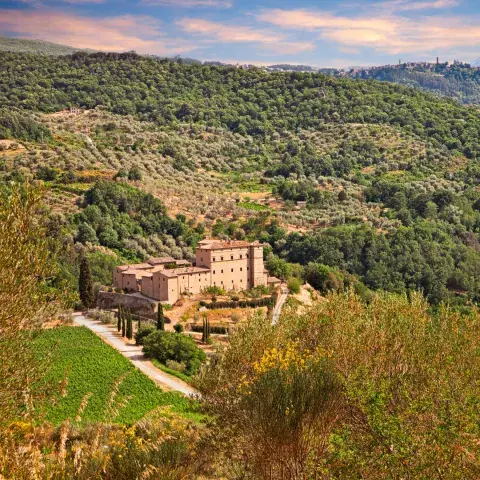
The new and innovative Potentino Exploration Project (PXP), Franklin University Switzerland’s new initiative in Seggiano, southern Tuscany, aims to focus on the heritage, archaeology, and biodiversity of this fragile landscape. Through integrated research, the project wants to increase awareness of the ethical management of endangered cultural and natural heritage while also connecting to and respecting the local community. In partnership with the Abess Center for Ecosystem Science & Policy at the University of Miami and Castello di Potentino, the project is scheduled to begin in June 2022, as part of Franklin's Summer Session I academic offer, and will welcome students to the beautifully restored Potentino Castle in Tuscany. The research design of the Potentino Exploration Project combines archaeological excavation, heritage studies, archaeobotany, biodiversity studies, land survey, and archaeometry as part of an interdisciplinary regional landscape analysis of the area around the Potentino Castle and the Seggiano Valley. Undergraduate and graduate students, as well as post-doctoral researchers, will actively be engaged in producing an integrated, transdisciplinary study of the area to provide crucial data for long-term planning and policy-making connecting to the holistic environmental and social framework set forth in the UN’s Sustainable Development Goals.
The management of heritage resources has become a global issue as rapid social change, political instability, industrial growth, and many other factors have a serious impact of global tangible and intangible heritage. Thus, heritage management programs are beginning to engage the issue of how heritage resources can be leveraged and utilized in a sustainable and ethically appropriate manner. The Seggiano region’s dramatically beautiful landscape has remained relatively unchanged over the centuries due to the lack of industrial agriculture in the region, their local traditional agricultural practices, and a distinct yet intangible culture that goes back thousands of years. These are today endangered because of the pressures of tourism, loss of population, lack of economic opportunity, and most of all, climate change. For this reason, important components of the project will also be science communication and community engagement, through education and community outreach, increasing awareness of the need for ethical management of endangered biodiversity and cultural heritage.
All students will participate in a weekly rotating Sci Comm team, which includes training and practice in science communication and storytelling, shaping cultural and environmental heritage through various forms of digital media content creation and outreach. The Sci Comm team’s aim is the development of skills across media formats and technologies to provide important professionalization opportunities for understanding and mastering the crucial role of storytelling in scientific practice.
To take the first step down the adventurous path of archaeology, environmental science, and heritage studies in the hills of Tuscany, Franklin students can choose from two distinct courses, Archeology and Material Heritage, and Biodiversity and Heritage.
The first will explore all aspects of archaeological field methodology, from actual excavation and documentation to the processing and study of material culture. It aims to reconstruct the history and prehistory of the Seggiano valley and the Monte Amiata region through a close study of the areas around Castello Potentino. The latter teaches the fundamentals of biodiversity measurement methods such as taxonomic transects while also considering biodiversity and the role of charismatic megafauna in the context of complex socio-ecological systems. It offers a deep-time perspective on human landscape use and heritage as embedded within local environments.
Learn more by visiting the PXP website and apply by 1 May 2022 to the project here.

